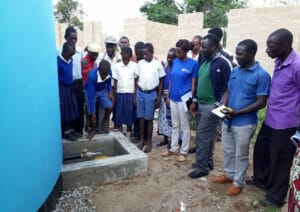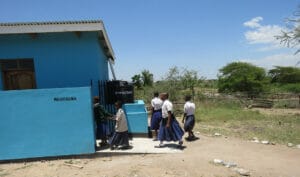News > Blog
Meet Tanzania’s Safe Water Superhero
Published 04/22/2019 by Global Communities

Yvonne Mwakisyala understands firsthand how access to clean water and sanitation is critical to keeping girls healthy, safe and on track with their education.
“My mum makes a joke that I hated dirty floors so much as a child that I never crawled and moved straight to walking,” says Yvonne, who serves as a construction officer for PCI Tanzania. “… My path was just about combining the two things I loved into one job—clean environments and construction.”
Although she grew up in Dar es Salaam, Tanzania’s largest city, Yvonne’s public school experience was similar to the students she now serves in the rural Mara Region.
“In primary school, I studied in almost the same conditions,” she says. “We wore the same uniforms. We were too many students in one classroom. The only difference was my parents could afford giving us lunch money and buying me different books to expand my view of the world and education.”
Yvonne’s work is part of PCI Tanzania’s U.S. Department of Agriculture-funded McGovern-Dole International Food for Education and Child Nutrition Program. In addition to providing daily school meals for more than 168,000 students in 256 schools, the program aims to promote good health and hygiene practices among teachers, parents and students. That’s where Yvonne fits in.

Photo by Hillary Dashina/PCI
As a construction officer, her job is to help schools in dire need of safe water and sanitation facilities. She designs and supervises construction projects that include everything from gender-specific bathrooms to water harvesting tanks. She also educates students, parents and other community members about how to properly use and maintain these facilities.
“It gives me great joy to see the changes in behavior it brings to people,” Yvonne says. “Plus, I really enjoy working with children, because they have room to learn and adapt new behavior in their lives compared to the adults.”
According to water.org, one-third of schools worldwide lack access to clean water and basic sanitation. And in the areas where PCI Tanzania works, that number is almost triple. Of the 2,697 primary schools surveyed in 2011, 84% did not have handwashing facilities and 86% did not have water for handwashing.
Unsafe school conditions don’t just interfere with students’ abilities to learn but can also jeopardize their health and lead to poor school attendance. At Ihale Primary School, sanitation facilities were so poor that the quality assurance team from the Bunda Town Council recommended the school be temporarily closed to avoid a disease outbreak among students.
“We had only four (filled up) drop hole toilets for 886 students with no running water,” said Francis Shande, head teacher at the school. “You can imagine just how bad the situation was.”
Adolescent girls are particularly vulnerable to the negative effects of unsanitary and ill-equipped school environments. Studies have found that some girls miss up to 5 days a month due to menstruation, and UNICEF estimates that 1 in 10 girls does not attend school during menstruation.
As a woman, Yvonne says she brings a unique and necessary perspective to her field of work that directly addresses this issue.
“My most memorable project has been the construction of female toilets that have a room where girls can go and clean themselves during their menstrual cycle and for it to actually have running water in it tapped from the roof during the rainy seasons,” she says. “I know it is a very small detail, but because most of these designs are done by men, they just assume you go in there and change your clothes. Now our PCI-built female latrines have water in the room. Girls can clean themselves and wash their reusable pads instead of missing school on those days.”

Photo by Victor Mapile/PCI Students at Ihale Primary School enter the new girls’ latrine built by PCI.
Since 2011, PCI Tanzania has helped a total of 103,456 school children gain access to an improved latrine at school. Of that number, more than 87% now have consistent access to clean and safe water.
“I used to receive frequent reports of stomach infection among students. They would ask permission to go home. But ever since students started using the new latrine and consuming water from the rainwater harvesting tank, these cases [of reported stomach infections] have dropped dramatically,” said Angela Mboya, a teacher at Ihale Primary School.
In the coming years, PCI will work with local government authorities and community leaders to invest in the construction of an additional 20 latrines and 34 water systems at prioritized primary schools. The goal is to reduce the number of primary students per drop hole to a ratio of 25:1 and to ensure access to safe and clean water for all students.
“I believe there will be a whole generation of young people that will have a better chance at education and hence a chance at better opportunities because of the impact this program will have in my country,” Yvonne says. “… The fact that I am at the core of ensuring these children have safe water, less water-borne diseases and attend school more makes me go to sleep feeling like a safe water superhero.”




